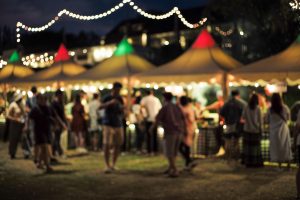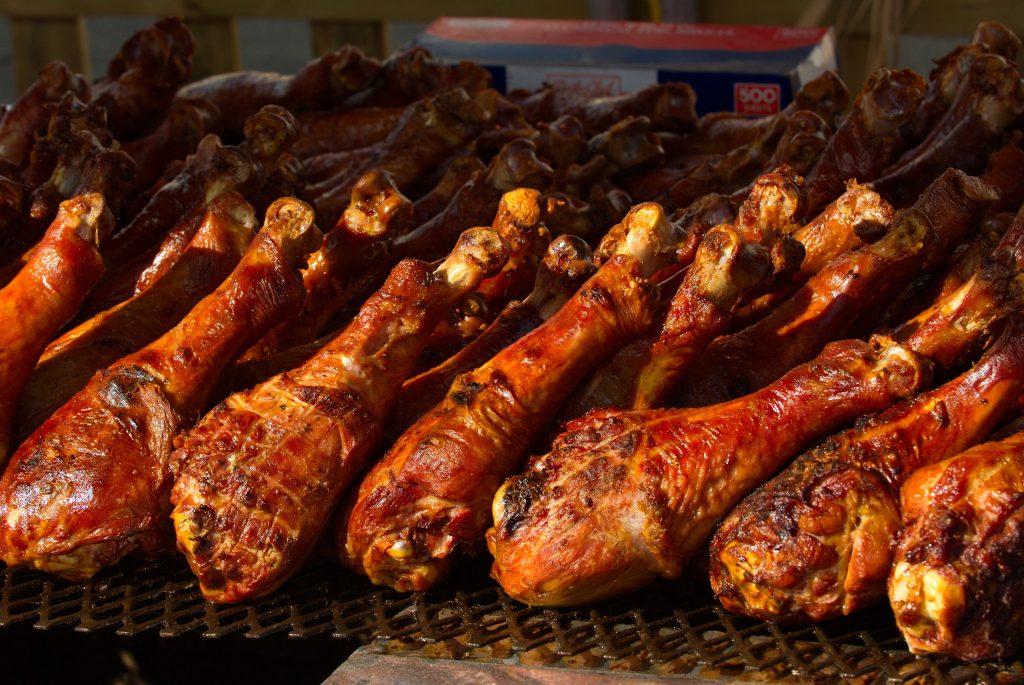Food as artifact: Oyster Bake and the Ways in which Food ‘Consumes’ our Existence

Oyster Bake at St. Mary’s University is a highlight event for students, families, friends, and the community at large. The annual spring festival serves as an opportunity for students to cut loose and enjoy the company of their peers with carnival festivities, live music performances, and lots of yummy foods. Food vendors are posted at every corner of the event, offering attendees delicious festival delicacies with a special San Antonian-twist. Every bite of a vendor turkey leg or strawberry con crema event communicates San Antonio’s unique history and culture through the miracle of food—the manifold phenomenon infused into the very heart of the human experience. Let’s go on a trip exploring how food ‘consumes’ our existence!
Food as a historical artifact.
In 2019 Stanford University and the University of Tours research teams worked together to bring to life a historical royal feast held in Renaissance France 1. By recreating the menu and exploring obscure details of the 15th century banquet, researchers hoped to rediscover food’s place in Renaissance France—as well as its effects on peoples stomachs today!
Beginning back all the way in 1916, Oyster Bake has become quite synonymous with San Antonio and its culture, transforming from a humble yearly business-gathering into a two-day festival with thousands of sponsors, volunteers, and attendees participating each year 2.
From beer and oysters to chicken-on-a-sticks and turkey legs, Oyster Bake and its food helps tell the story of St. Mary’s University—whose students all its proceeds go to—and the San Antonio community at large 3.
Food as a cultural artifact.
Marcie Cohen Ferris discusses culture’s influence on food in her 2015 “History, Place, and Power: Studying Southern Food” in a 2015 issue of Southern Cultures. “A multi-layered past and present underlies these foods and explains why southerners eat the way they do,” Ferris says, “And why we think of these foods as deeply southern. Food is history. Food is place. Food is power and disempowerment” 4.
Oyster Bake not only serves as an opportunity for its community to gather together and enjoy an experience unique to San Antonio, but to celebrate St. Mary’s University, and raise money for its students 5. The festival serves as an opportunity for the university to share it pieces of its culture to attendants (as well as real estate for festivities).
Also present is a menu of festival foods signature of communities in Southern Texas: Strawberry con crema, cream corn, and sweet Texas barbecue! San Antonio offers a unique taste for each of these dishes, with every bite serving up a piece of San Antonio’s culture and history.
Food as a social artifact.

Bruce Pietrykowski’s case study in a 2004 issue of Review of Social Economy, goes beyond discussing food’s influence on identity and class, also placing focus on its role in shaping society at large 6.
Oyster Bake is a social event for St. Mary’s students as well as its local community. Friends, families, and peers in attendance interact and participate in festivities that, thinking more critically, encourage and advance Marianist values within the community.
As it relates to “slow food”, foods that embody and preserve the unique character of their environments, Oyster Bake’s offerings help annually promote Southern Texas fare and San Antonian food culture at large.
Food as a psychological artifact.
In “You Are How You Eat: Fast Food and Impatience,” researchers Chen Bo-Zhong and Sanford E. DeVoe explore food’s psychological effect on people. By the end of their project, the researchers found that fast-food effected individual’s mental states, creating outcomes like increased desires for immediate return 7.
Oyster Bake represents a major opportunity for the university and community to kick up their feet and enjoy themselves, and for students, during a particularly busy time of the semester. The event is a moment of rest amidst preparation for finals and summer break. For the community too, Oyster Bake and Fiesta are signposts for the coming summer vacation.
When San Antonio locals hear “sausage-on-a-stick”, their minds likely go to very few places—to Oyster Bake perhaps most prominently. Similar to how the smell of popcorn reminds some people of the movies and barbecue reminds others of family, food carries memories and meaning with it. Sausage-on-a-stick reminds them of life in San Antonio and celebratory events like Oyster Bake—memories having to do with summer vacation and school nostalgia.
Conclusion

On campus at St. Mary’s University, you can smell when Oyster Bake is in the air. The games, festivities, and live music are all good and fun, but the food remains the dimension that brings some of the most buzz. As people reflect on food’s purpose in their lives—and chew on a giant turkey leg while they’re at it—they are reminded of food’s historical, cultural, social, and psychological place in their lives. It is, in a way, the thing that eats at us—consuming every facet of the way we live life.
- Rodin, Jesse, and Bruno Laurioux. “Reimagining and Reconstructing the Renaissance Banquet | France-Stanford Center for Interdisciplinary Studies.” France-Stanford Center for Interdisciplinary Studies. Accessed April 16, 2025. https://francestanford.stanford.edu/projects/reimagining-and-reconstructing-renaissance-banquet. ↵
- “About – Fiesta Oyster Bake | April 25 – 26, 2025.” Fiesta Oyster Bake | April 25 – 26, 2025. Last modified December 17, 2024. https://oysterbake.com/about/. Accessed April 7, 2025. ↵
- Tom Reel, “The History of Fiesta Oyster Bake,” MySA, San Antonio Express-News, April 8, 2015, https://www.mysanantonio.com/fiesta/article/Fiesta-Oyster-Bake-6173405.php. ↵
- Ferris, Marcie Cohen. “History, Place, and Power: Studying Southern Food.” Southern Cultures 21, no. 1 (2015): 2–7. http://www.jstor.org/stable/26220209. Accessed April 7, 2025. ↵
- “About – Fiesta Oyster Bake | April 25 – 26, 2025.” Fiesta Oyster Bake | April 25 – 26, 2025. Last modified December 17, 2024. https://oysterbake.com/about/. Accessed April 7, 2025. ↵
- “Bruce Pietrykowski, “You Are What You Eat: The Social Economy of the Slow Food Movement,” Review of Social Economy 62, no. 3 (2004): 307–21, http://www.jstor.org/stable/29770263. ↵
- Chen-Bo Zhong and Sanford E. DeVoe, “You Are How You Eat: Fast Food and Impatience,” Psychological Science 21, no. 5 (2010): 619–22, http://www.jstor.org/stable/41062259 ↵


4 comments
rmanzur
This article was beautifully written and full of insight! I loved how it explored food from so many angles—historical, cultural, social, and psychological. The connection to Oyster Bake made it personal and local, while still addressing universal themes. It made me reflect on how meaningful food truly is in our lives. Great job blending research and storytelling!
Micaella Sanchez
As a first-year student, this was my first event, and I can say it was a truly unique experience from traditional Mexican food to carnival food. I feel that it really sets the bar for the tradition that Oyster Bake holds. I have heard a great deal about it, and everything I’ve listened to was true. This was a great article in really showing how Oyster Bake holds up.
Carlos Flores
This was such a creative and rich exploration of how food shapes our lives. I loved how you connected Oyster Bake not just to tradition and celebration, but to deeper ideas like history, psychology, and identity. One thing that really fascinated me was your point about how certain foods — like sausage-on-a-stick — can trigger powerful memories and emotions. It’s easy to overlook how much food ties us to time, place, and community, but your piece made that connection feel so real and meaningful. The idea that food “consumes” us, in more ways than one, is such a brilliant reflection. You captured the spirit of Oyster Bake and gave readers a lot to chew on — literally and figuratively.
Meadow Ayala
I really loved reading this — it captured so beautifully how food is so much more than just something we eat. The way you connected Oyster Bake to history, culture, community, and even psychology really made me think about how much meaning we tie to flavors and traditions without even realizing it. You showed that events like Oyster Bake aren’t just about fun or food, but about memories, identity, and celebration. It’s amazing how one event can bring a whole city’s heart and history together through every bite. This really made me appreciate the deeper story behind something so familiar!